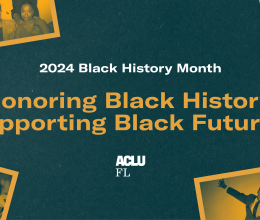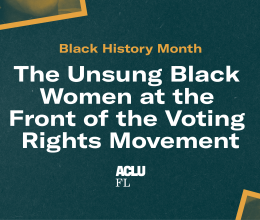
Last month, in a meeting of the Florida Board of Executive Clemency, Florida CFO Jimmy Patronis asked a black man seeking to have his civil rights restored how many children he has and “how many different mothers to those children?”
It is outrageous that a member of the (all-white) Florida Clemency Board would ask an African-American man seeking to have his right to vote restored how many children he has and by how many different women.
Besides being completely irrelevant to the question of voting eligibility, this line of questioning is offensive and prejudicial because it rests upon a long history of pernicious racist stereotypes that are as familiar as they are destructive: these questions immediately summon up the image of black men as “baby daddies” who irresponsibly have multiple children with multiple women out of wedlock. There is a long and shameful history of racist tropes about black male sexuality and absent-fatherhood which persists to this day, as can be seen in last month’s controversy over Target perpetuating these stereotypes by selling “baby daddy” Father’s Day cards featuring an African-American couple on the front.
This age-old racist narrative has no place in our clemency process. Patronis’ campaign’s statement explaining that similar questions were asked to white men in the past, and that the questions were justified because they focused on determining child support, is insulting and tone-deaf. Any suggestion that these questions are free of racial bias because they have also been asked of a white man in the past misses the point –asking a white man whether they like to eat watermelon is simply not the same as asking a black man that same question because of the long history of racial stereotypes related to it. Moreover, child support payment information can easily be obtained without inquiring “how many different mothers to those children?” an irrelevant question that inevitably evokes racial stereotypes.
Since when did voter eligibility depend on the number of children someone has?
It is also beyond hypocritical for CFO Patronis, an anti-choice politician, to suggest that the number of children someone has with different women is a character flaw that has any bearing on a person’s fitness to vote.
The direct result of implementing policies based on Patronis’ beliefs (restricting access to and education surrounding birth-control; banning abortions) would be multiple children with different women, unless, of course, everyone only has one intimate relationship in their lifetime.
But separate from the offensiveness of the question – separate from the hypocrisy of it – is the issue of what in the world that question has to do with whether an individual should be allowed to exercise their fundamental right to vote.
Since when did voter eligibility depend on the number of children someone has?
When a debt is paid, it is paid: when someone completes the terms of their sentence, they have paid their debt to society and should be given a second chance to have the rights and responsibilities that come with being a citizen in our democracy restored to them. That shouldn’t come at the cost of arbitrary waiting periods, administrative delays, and then finally, once you’ve completed that process, being subjected to offensive and humiliating questions by the politicians who get to pick and choose who votes for them – questions that have nothing to do with your eligibility to vote.
The fact that questions rooted in offensive assumptions are being used as criteria to determine a citizen’s eligibility to vote is just another example of how our state’s broken and arbitrary clemency system is a failed relic of a more racist past and must be fixed.




